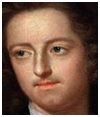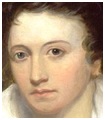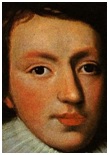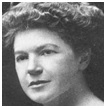|
 |
|
 |
Poetry - Leadership
The English poet (pictured right) wrote this after having his diseased foot amputated. The poem inspired the South African leader, Nelson Mandela (pictured right below) during his 27 years of imprisonment. So the 2009 film about him was given the same title. It is the Latin word for undefeated, because moral victory over adversity rings through
Henley’s stirring poem. The first and last verses are particularly inspiring:
Out of the night that covers me, Black as the pit from pole to pole, I thank whatever gods may be For my unconquerable soul (first verse)
It matters not how strait the gate, How charged with punishments the scroll, I am the master of my fate: I am the captain of my soul. (last verse)
Alfred, Lord Tennyson (1809-92), Ulysses
(1833) The English poet (pictured right) says Ulysses inspires his men through:
1. Action “I will drink life to the lees (the sediment at the bottom of a wine bottle)”.
2. Learning Ulysses recommends “to follow knowledge like a sinking star”.
3. Hope and optimism Ulysses exhorts his men to “seek a newer world”, despite their old age and the risks they face.
4. Challenging aims Ulysses tells his men “to strive, to seek, to find, and not to yield” in the last line:
Tho' much is taken, much abides; and tho' We are not now that strength which in old days Moved earth and heaven; that which we are, we are; One equal temper of heroic hearts, Made weak by time and fate, but strong in will To strive, to seek, to find, and not to yield. (last six lines)
Alfred, Lord
Tennyson, The Charge of the Light Brigade
(1854) Another of Tennyson's poems describes the brave attack by over 650 British cavalry on 25th October 1854 in the Crimean War. It was disastrous (over a 100 killed in minutes), because their leader (Lord Raglan, pictured right) sent them in the wrong direction! Tennyson writes in the first two verses:
Half a league, half a league, Half a league onward, All in the valley of Death Rode the six hundred. 'Forward, the Light Brigade! Charge for the guns' he said: Into the valley of Death Rode the six hundred.
'Forward, the Light Brigade!' Was there a man dismay'd? Not tho' the soldiers knew Some one had blunder'd: Their's not to make reply, Their's not to reason why, Their's but to do and die: Into the valley of Death Rode the six hundred.
Thomas Gray (1716-71), Elegy Written in a
Country Churchyard (1750) The English poet (pictured right) emphasizes the importance of:
Let not ambition mock their useful toil, Their homely joys, and destiny obscure; Nor grandeur hear with a disdainful smile The short and simple annals of the poor.
The boast of heraldry, the pomp of pow'r, And all that beauty, all that wealth e'er gave, Awaits alike th' inevitable hour. The paths of glory lead but to the grave. (verses 8 and 9).
The last line has become particularly famous - the classic 1957 anti-war film was called Paths of Glory.
Percy Shelley (1792-1822), Ozymandias
(1818) In this poem the English poet (pictured right) reminds you that power and leadership can quickly disappear. The once great power of the dead ancient Egyptian king, Ozymandias, has been reduced to a ruined statue in the desert:
Nothing beside remains. Round the decay Of that colossal wreck, boundless and bare The lone and level sands stretch far away. (last three lines)
William Shakespeare (1564-1616), Sonnet
94 Shakespeare (pictured right) says the best leaders have:
They that have power to hurt, and will do none, That do not do the thing they most do show, Who, moving others, are themselves as stone, Unmoved, cold, and to temptation slow; They rightly do inherit heaven's graces. (first five lines).
Shakespeare finishes the sonnet by saying that people are judged by their actions. “For sweetest things turn sourest by their deeds”, he says in the penultimate line.
John Milton (1608-74), What Though the Field Be Lost?
- from Paradise Lost (1667) Winston Churchill loved Satan's rallying call of eternal defiance in Milton's (pictured right) poem:
What though the field be lost? All is not lost; the unconquerable Will, And study of revenge, immortal hate, And courage never to submit or yield.
Arthur Hugh Clough
(1819-61), Say Not the Struggle Nought Availeth
(1865) During World War Two Churchill also quoted this inspirational message from the English poet (pictured right)
Say not the struggle naught availeth, The labour and the wounds are vain, The enemy faints not, nor faileth, And as things have been they remain. (first verse)
Ella Wheeler Wilcox (1850-1919), Passing The Buck The American poet (pictured right) says take responsibility and don't pass the buck: Whatever the task that comes your way, Just take it as part of your luck. Look it right square in the eyes, and say, 'This is my task, I'll do it to-day': Don't pass the buck.
Oh! whether you cook, or whether you fight, Or whether you trundle a truck, Just tackle your job and do it right: Don't pass the buck.
The wheels of the earth have gone, alack! Deep into war's mire and muck. If you want to put it again on its track, Don't shift your load on another man's back: Don't pass the buck. (complete poem)
Bob Dylan (1941- ), It's Alright, Ma
(I'm Only Bleeding), 1965 Dylan's (pictured right in 1963) song questions leaders' integrity and example:
Although the masters make the rules For the wise men and the fools I got nothing, Ma, to live up to. (verse 12) |
|
|
||
|
|
|
||
|
||
| Copyright © wisdomtowin.com All Rights Reserved | ||
|












